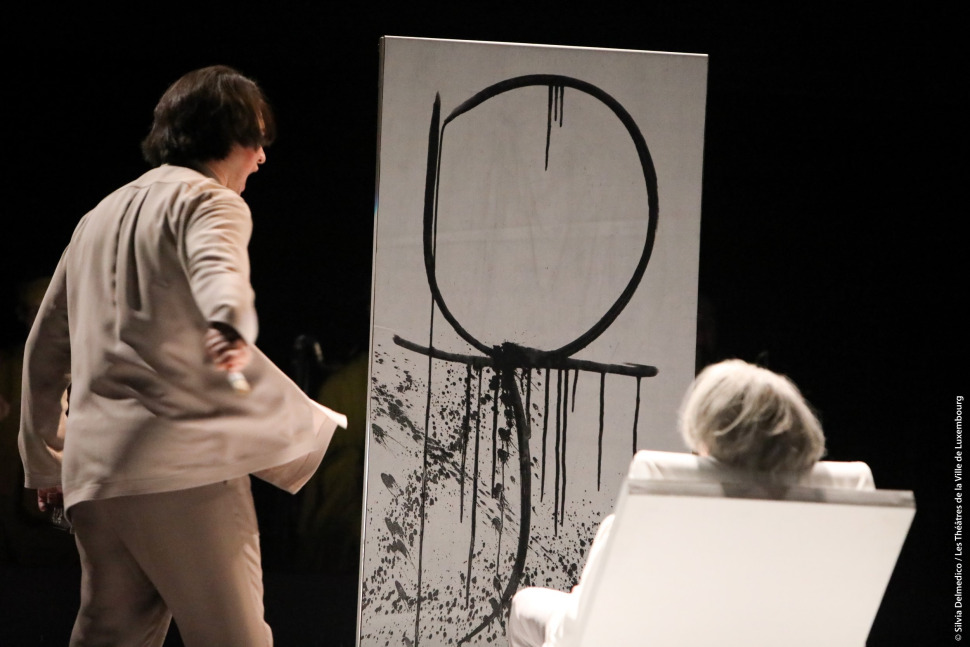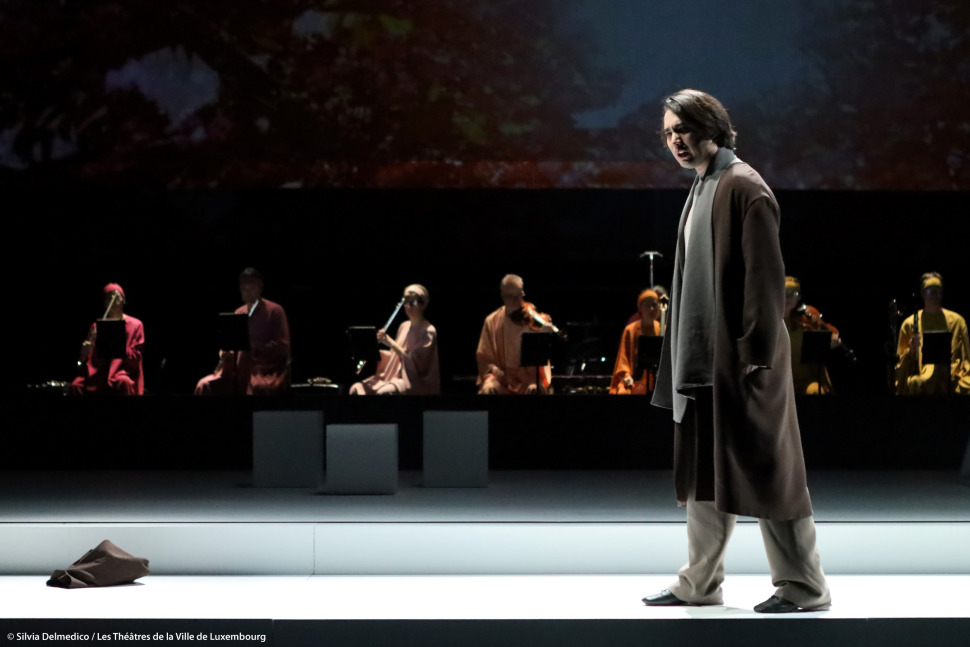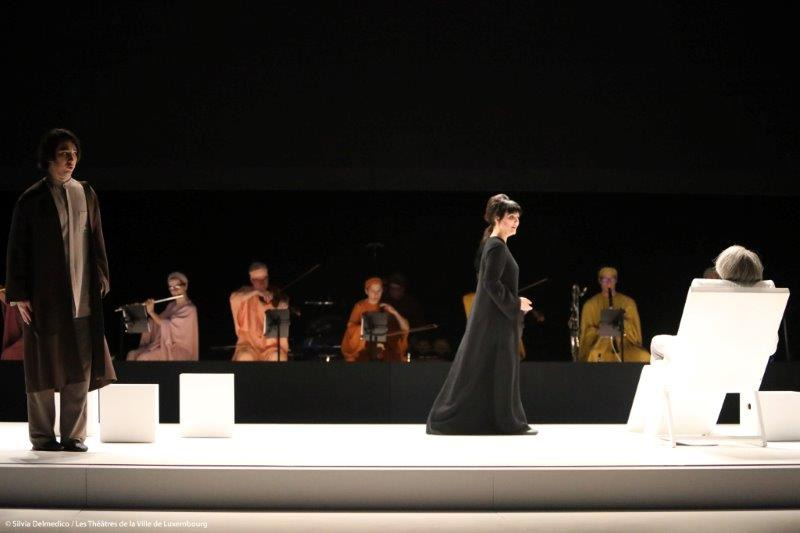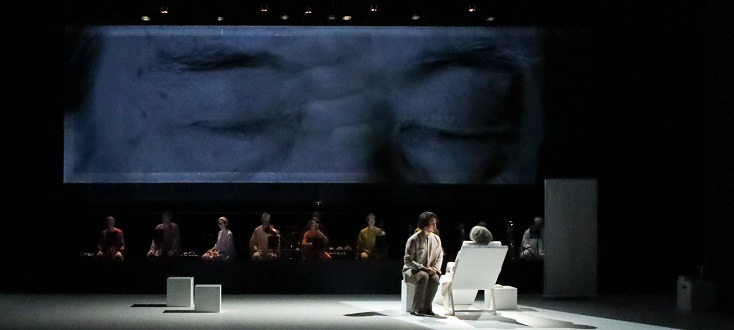
“The paralysed writer Omiya Akifusa is deprived of his language, his ges- tures and his words. How can a creative individual still live when deprived of his means of artis- tic expression? What becomes of his story, his past, his present and how does the Other invent his future? Interwoven with questions on creation, transmis- sion, memory, and loss, Yasunari Kawabata’s metaphysical short story oscillates between apparition and extinction and brings into play an alternation between the tangible and the world beyond, the inner and the outer, silence and music. The road that leads Mita to the home of the Master and his daughter Tomiko is an initiatory journey through a tunnel near a crematorium where errant souls mingle with the ghost of a young woman. Who is she? What does she symbolise? Will she materialise? The journey takes us to the edges of this strange tale in which the audience is led into an irrational, ambiguous world where oft- grotesque humour combines with tragedy to witness the metamorpho- sis of Tomiko, a young woman sacrificed to the father figure. For this chamber opera production with its spellbinding music and lyrics by Alexandre Desplat, the singers will move about in a horizontal, abstract, minimalist space. Their songs will seem to be enveloped in a spectral light to create a floating, indistinct, ghostly world. The ten musicians at the rear of the stage will appear as key characters in the dramaturgy. Dressed in baroque costumes and positioned in a single, slightly raised line, they will appear to represent a luminous chromatic scale: the reminiscence of an orchard in springtime, offering an open and vibrant horizon for the Master’s gaze, a depth of field conducive to brin- ging life to dead souls capable of being reborn indefinitely in this pur- suit of beauty, this quest for Nature so dear to the author. In the centre of the stage, a black and white space represents the house where the Master will sit in silence with his back to the audience; a fundamental presence facing the musicians and flanked by the two singer-protagonists Tomiko and Mita. Downstage – an area symbolic of writing – the narrator will perform several roles and take possession of the story. Between these three materialised worlds, a mental space will emerge through a video haunted by the image of the writer: symbols, calligraphy, phantasms, flashes. Solrey”
https://www.bouffesdunord.com
“Célébré et couronné de prix (Oscars, Césars, Golden Globes, Grammy Awards) pour ses musiques de film, Alexandre Desplat crée au Grand Théâtre de Luxembourg son premier opéra : "En Silence" d'après une nouvelle du prix Nobel de littérature japonais, Yasunari Kawabata (avec un livret en français d'Alexandre Desplat et de la metteuse en scène Solrey)...Mikhail Timoshenko, qui est baryton-basse, entre ainsi à froid sur une voix de tête flûtée mais il se repose bientôt sur le grave boisé de la clarinette-basse. Dans un français intelligible et sensible de bout en bout, il narre l'errance et le doute avec une distance très appliquée (l'ensemble des costumes rappelle le Japon esthétisé par Bob Wilson, le sien a des touches de Wanderer : du romantique errant alors que la femme sera dans un noir très sobre, triste comme sa mine). Le phrasé de Timoshenko reste souple et suave alors que le baryton doit effectuer de nombreux voyages à travers ses registres.”
https://www.olyrix.com/
“En Silence is a short story by Japanese writer Yasunari Kawabata whose subtle and nuanced universe, written in fluid and poetic prose, has inspired the duo of renowned film music composer Alexandre Desplat which is the first work for opera, and director-musician Solrey to create a chamber opera. The opera will be performed February 26 and 27 at the Grand Théâtre de Luxembourg and March 2 and 3 at the Théâtre des Bouffes du Nord in Paris. Just as Kawabata’s literature opens the reader’s imagination to infinity, Desplat’s cinema scores evoke evanescent melancholy, sustained emotions and subtle sensations and thus create the perfect connection to the invisible and intangible matter of this novella. Director Solrey has gathered a team comprising the actor Sava Lolov, the singers Camille Poul et Mikhail Timoshenko and Luxembourg’s United Instruments of Lucilin to create this mysterious universe...”
https://www.durand-salabert-eschig.com/
“Le plateau est dominé néanmoins par le jeune baryton-basse russe Mikhail Timoshenko, dont on saluera tout d'abord l'excellente diction française. Sollicitée dans les graves les plus abyssaux comme dans les hauteurs du registre de fausset, sa voix rend pleinement justice à une écriture vocale essentiellement déclamée, mais qui se faire plus lyrique dans les moments de forte intensité dramatique.”
https://www.resmusica.com/
“L’usage de cloisonner les genres et les pratiques, qui dépend souvent de tropismes plus ou moins nationaux ou culturels, conduit parfois à rendre certains créateurs prisonniers d’une catégorie où ils s’illustrent le mieux. Ainsi Alexandre Desplat, reconnu et récompensé pour ses musiques de film, a-t-il reçu, de la part des Théâtres de la Ville du Luxembourg la commande de son premier opéra, créé le 26 février 2019 dans le Grand-Duché. C’est le format de chambre que le compositeur a retenu pour En silence, adaptant, avec Dominique Lemonnier, dite Solrey – elle signe également la mise en scène – une elliptique nouvelle homonyme de Yasunari Kawabata, dans la petite salle modulable du complexe théâtral, aux dimensions et disposition idéales pour cette création délicate...”
http://www.anaclase.com